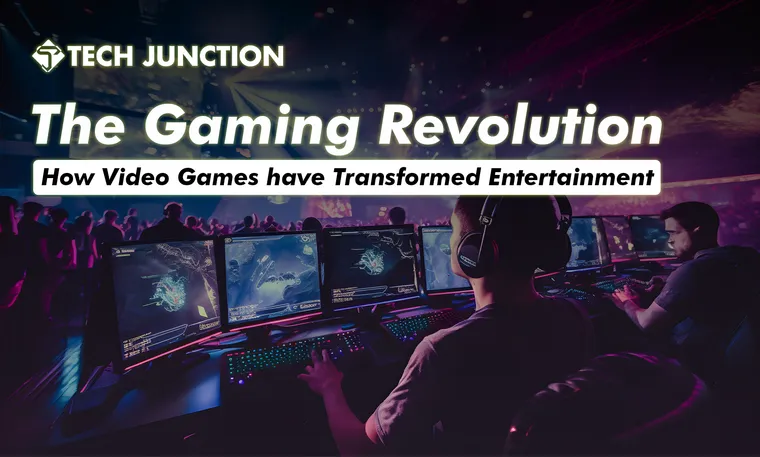Video games have dominated the entertainment industry in recent years. What was once considered an exclusive passion for a select few is now a popular form of entertainment enjoyed by millions of people across the world. From smartphone games to enormous multiplayer games on the internet, the gaming business has grown to match the film and music industries.
Video games provide a brief relief from our stressful lives in a world where time is a valuable asset. Mobile games give fast pleasure at our fingertips, whether we are commuting, waiting for an appointment, or just passing the time. There is something for everyone, catering to varied likes and preferences, with hundreds of gaming alternatives accessible on app stores.
As technology advanced, games became more visually appealing, immersive, and technically complex, adding to the gaming industry's rise. The new move has drawn in both regular and devoted gamers, expanding the industry's user base and earnings. In this blog, we will cover some major points on how video games have revolutionized entertainment.
Technological Advancements
Graphics and Sound Improvement
From 8-bit graphics resolution with 256 colors to 64-bit realistic 3D visuals, the game development industry has advanced substantially. The game development industry's ongoing technology improvements have shifted towards customization and user-centricity.
The amount of immersion produced by current sound design would astound video game pioneers today. Game developers may build rich and lifelike soundscapes by combining high-quality recordings and software. Sound design is essential in establishing a convincing and interesting gaming environment, from the roar of engines in racing games to the gentle rustle of trees in an open-world adventure.

The future of immersive audio in video games has a lot of hope. We should expect increasingly more immersive audio experiences to enhance games as technology advances.
Introduction of Virtual Reality (VR) and Augmented Reality (AR)
With its interactive components and technological developments, AR/VR in gaming has revolutionized the playing experience. AR mixes 3D images with real-time surroundings to present gamers with a multidimensional experience. VR, on the other hand, involves physical activities and gaming setups that enhance the game's realism.
AR games have a market share of $8.4 billion in 2022 and may reach $43.1 billion by 2028 as a result of these improvements. VR in gaming has a market value of $12.13 billion in 2022 and is expected to exceed $2.4 billion in revenue by 2024.

Previously, AR/VR games were simple, with superimposed graphics on the faces of characters or 3D images to make the game look genuine. At the moment, AR/VR games have overcome these constraints by incorporating the real world into the system.
Designers are always attempting to incorporate AR and VR into the game business and build a faultless virtual environment using technology and imagery. Soon, games will be able to orient themselves, comprehend and interact with the player's psyche, and modify and move in real time. You can now envision the future of AR/VR in gaming and predict how these technologies will affect the industry.
Cultural Impact
Rise of Gaming Communities
Gaming communities have transcended geographical boundaries, bringing together individuals from diverse backgrounds and cultures. The communal nature of cloud gaming has fostered a sense of shared enthusiasm, creating spaces where like-minded individuals can connect over their favorite games.
In Discord's "Fortnite Community," players connect globally, discussing strategies and sharing highlights, fostering camaraderie around their shared passion for the game. Gaming communities are extremely important in the development and success of video games. They bring people together, break down barriers, give feedback, and help people improve their social skills. To preserve and promote these good elements, it is critical to create a courteous and pleasant culture among gaming communities.
Influence on Popular Culture, Movies, and Music
Video game themes and characters have permeated popular culture, with references appearing in movies, TV shows, and music videos. The success of video game adaptations into movies and series highlights the deep integration of gaming into broader entertainment mediums. "The Last of Us" has made a successful transition to television, with its first season already aired. The adaptation showcases how video game narratives and characters can seamlessly integrate into TV series, emphasizing the enduring impact of gaming on broader entertainment mediums.

Gaming soundtracks and compositions have influenced contemporary music, with collaborations between game developers and musicians becoming increasingly common. Gaming aesthetics and characters often inspire fashion trends, and gaming-related merchandise has become a significant part of pop culture consumerism.
Changing Stereotypes and Perceptions of Gamers
The stereotype of a typical gamer has evolved, acknowledging the diverse demographics that engage in gaming, including age, gender, and cultural backgrounds. The rise of professional gaming has shattered the stereotype of gaming as a solitary and unproductive activity, showcasing the dedication and skill required for competitive play. Games now feature more positive and diverse representations of characters, challenging outdated stereotypes and promoting inclusivity.
Economic Significance
Gaming Industry Revenue and Market Size
The gaming industry has undergone a meteoric rise, transforming into a global economic powerhouse. With annual revenues surpassing those of the film and music industries combined, the market size reflects the insatiable appetite for interactive entertainment. The gaming sector has become a major contributor to the global economy, with a market valuation that continues to ascend, solidifying its status as a dominant force in the entertainment landscape.
Job Creation and Career Opportunities in the Gaming Sector
Beyond financial metrics, the gaming industry has emerged as a robust source of employment and career opportunities. The demand for skilled professionals in game development, design, marketing, and esports management has surged. As the industry diversifies, it not only generates jobs directly related to gaming but also fosters an ecosystem of supporting roles, creating a vast and dynamic employment landscape.
Social and Educational Benefits
Positive Effects on Cognitive Skills and Problem-solving Abilities
A 2015 research discovered that playing video games can help you learn quicker, focus better, and have better motor control. Many games need extensive planning and strategic thinking in order to be successful, so those brain muscles are constantly used and strengthened. Even if a video game is not branded as "educational," it can nonetheless assist youngsters in developing decision-making abilities. Playing games involves strategizing, anticipating outcomes, and reacting rapidly to events.
Gaming as a Social Activity and Tool for Connecting People Globally
Popular video games can assist youngsters in making new acquaintances. Many youngsters consider video games as a social activity and a means to connect with other kids who share their interests. Gaming is a common subject of conversation among students and a fantastic icebreaker for children looking to broaden their buddy network and build positive connections. According to research, many youngsters identified "making new friends" as a motivation for playing video games.
Playing team-based games may often lead to strategic planning, coordinating, and exchanging information and abilities with other players. This can help youngsters enhance their teamwork abilities and make them more productive and at ease while working in groups at school.
Future Trends
Emerging Technologies Shaping the Future of Gaming
The future of gaming is intertwined with emerging technologies. Several themes and technology stand out as we look into the future of video gaming. AI will continue to grow, providing more individualized and immersive experiences. AR and VR will be integrated increasingly into the best video games, resulting in richer and more involved gameplay.
5G technology will enable quicker and more responsive gaming experiences, while blockchain/NFT integration will reshape ownership and value in mobile games. These technologies promise unprecedented immersion, accessibility, and connectivity, propelling the industry into new frontiers of innovation.
Anticipated Trends in Game Development and Design
The evolution of game development and design continues to captivate audiences. Trends such as hyper-realistic graphics, artificial intelligence integration, and player-driven narratives are shaping the next generation of games. Developers are exploring innovative storytelling methods, emphasizing player agency, and pushing the boundaries of creativity.
Conclusion
In retrospect, the journey through the gaming revolution has unfolded across diverse dimensions. From economic significance to social and educational benefits, each facet underscores the profound impact of video games on the global stage. The enduring influence of video games on entertainment cannot be overstated. From humble beginnings to a multi-billion-dollar industry, video games have reshaped how we consume and participate in entertainment, leaving an indelible mark on cultural, economic, and technological landscapes.
As we navigate the ongoing gaming revolution, the horizon teems with possibilities. The interplay of technology, culture, and innovation promises an exciting future where video games, as both a form of entertainment and a cultural force, will continue to evolve and redefine the boundaries of what is possible in the realm of interactive experiences. The gaming revolution persists, an ever-evolving narrative that captivates and inspires millions around the globe.
The Tech Junction is the ultimate hub for all things technology. Whether you're a tech enthusiast or simply curious about the ever-evolving world of technology, this is your go-to portal. If you want to write for us or have any feedback feel free to email us.



